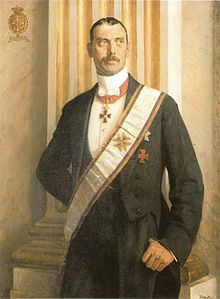Christian X of Denmark
| Christian X | |
|---|---|
| King of Denmark and Iceland | |
 |
|
| King of Denmark (more...) | |
| Reign | 14 May 1912 – 20 April 1947 |
| Predecessor | Frederick VIII |
| Successor | Frederick IX |
| Prime Ministers | |
| King of Iceland | |
| Reign | 1 December 1918 – 17 June 1944 |
| Prime Ministers | |
| Born |
26 September 1870 Charlottenlund Palace |
| Died | 20 April 1947 (aged 76) Amalienborg Palace |
| Burial | Roskilde Cathedral |
| Consort | Alexandrine of Mecklenburg-Schwerin |
| Issue |
Frederick IX Knud, Hereditary Prince of Denmark |
| House | Glücksburg |
| Father | Frederick VIII of Denmark |
| Mother | Louise of Sweden |
| Religion | Lutheran |
Christian X (Christian Carl Frederik Albert Alexander Vilhelm; 26 September 1870 – 20 April 1947) was the King of Denmark from 1912 to 1947 and the only king of Iceland (where the name was officially Kristján X), between 1918 and 1944.
He was a member of the House of Glücksburg and the first member of his family since king Frederick VII to have actually been born into the Danish royal family; both his father and his grandfather were born as princes of a German ducal family. Among his siblings was King Haakon VII of Norway.
His character as a ruler has been described as authoritarian and he strongly stressed the importance of royal dignity and power. His reluctance to embrace democracy resulted in the Easter Crisis of 1920, in which he dismissed the democratically elected cabinet with which he disagreed, and instated one of his own choosing. This was nominally his right in accordance with the constitution, but facing the risk of the monarchy being overthrown he was forced to accept democratic control of the state and the role as a nominal constitutional monarch.
In spite of becoming unpopular due to his resistance to democracy, during the German Occupation of Denmark he did become a popular symbol of resistance to German occupation, particularly because of the symbolic value of the fact that he rode every day through the streets of Copenhagen unaccompanied by guards. He also became the subject of a persistent urban legend according to which, during Nazi occupation, he donned the Star of David in solidarity with the Danish Jews. Danish Jews were not forced to wear the Star of David. However, the legend likely stems from a 1942 British report that claimed he threatened to don the star if this was forced upon Danish Jews. This is also supported by the king's personal diary, where the following entry can be found:
When you look at the inhumane treatment of Jews, not only in Germany but occupied countries as well, you start worrying that such a demand might also be put on us, but we must clearly refuse such this due to their protection under the Danish constitution. I stated that I could not meet such a demand towards Danish citizens. If such a demand is made, we would best meet it by all wearing the Star of David.
...
Wikipedia
